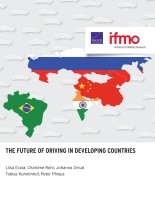| 来源类型 | Research Reports
|
| 规范类型 | 报告
|
| ISBN | 9780833086044
|
| 来源ID | RR-636-ifmo
|
| The Future of Driving in Developing Countries |
| Liisa Ecola; Charlene Rohr; Johanna Zmud; Tobias Kuhnimhof; Peter Phleps
|
| 发表日期 | 2014
|
| 出版年 | 2014
|
| 页码 | 132
|
| 语种 | 英语
|
| 结论 |
Nine Non-Economic Factors Increase Automobility- Factors fall into two categories: transportation policy factors (car infrastructure, inexpensive fuel, pro-car policies, and lack of alternatives to driving) and exogenous factors (active population, domestic oil, domestic car industry, spatial dispersion, and car culture).
- These nine factors seem to have affected automobility in developed countries.
These Factors Are Correlated with Automobility- The nine factors, each assigned a weight and scored, together yield an automobility score for each country.
- The automobility scores were good predictors of automobility in the developed countries. Car infrastructure and spatial dispersion seem to be the most significant.
Developing Countries Are Forecasted to Have a Range of Automobility Outcomes- According to the automobility scores, Brazil is forecasted to have the highest levels of automobility, and India the lowest.
These Findings Have Policy Implications- The factors that influence travel demand, especially the exogenous ones, change only slowly over time. Substantial growth in personal vehicle travel is likely to occur no matter what transportation policies are adopted.
- Although there is a strong correlation in developed countries between income growth and growth in vehicle travel, income levels alone are not good predictors of travel demand.
- Understanding economic growth is quite helpful in understanding changes in travel demand over time within a country but far less so in understanding travel demand differences between countries.
- Policymakers can influence travel demand through transportation policies. Especially in developing countries, where the infrastructure and spatial patterns are still being developed, there are opportunities to dampen the demand for driving.
|
| 主题 | Developing Countries
; Exploratory Modeling
; Statistical Analysis Methodology
; Surface Traffic Models
; Transportation Modeling
; Transportation Planning
|
| URL | https://www.rand.org/pubs/research_reports/RR636.html
|
| 来源智库 | RAND Corporation (United States)
|
| 资源类型 | 智库出版物
|
| 条目标识符 | http://119.78.100.153/handle/2XGU8XDN/107763
|
推荐引用方式
GB/T 7714 |
Liisa Ecola,Charlene Rohr,Johanna Zmud,et al. The Future of Driving in Developing Countries. 2014.
|
|
文件名:
|
x1495316285758.jpg
|
|
格式:
|
JPEG
|

|
文件名:
|
RAND_RR636.pdf
|
|
格式:
|
Adobe PDF
|
除非特别说明,本系统中所有内容都受版权保护,并保留所有权利。